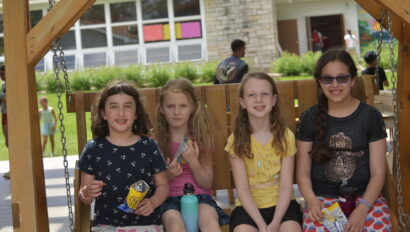This week’s D’var Torah is inspired by how I spent this week – more on that, below – and also by the 10th anniversary celebration of the Chicago Jewish Day School (CJDS), a heart-warming and thought-provoking celebration of many members of our greater Ramah community and of a school that is one of our many educational partners in promoting an inclusive, rooted, passionate, and living commitment to our rich traditions and the challenges of today’s world.
The book of Shemot, which we finish reading this week, begins as a continuation of both the narrative and format of its predecessor, Genesis. In the first verses we are reminded of the twelve sons of Israel who descended to Egypt and of a Pharoah’s emergence who did not know Joseph. It is the story of a specific family characterized by prominent individuals, ultimately human in their moments of success and in their fallibility. This motif continues through the opening verse of the second chapter, when we are told of a Levite man taking a Levite woman and producing a son. If form held, the book would continue narrating the exploits of Moses, and it does – for a while.
Ultimately, however, shortly after the scene at the Burning Bush, the very form of the Torah shifts for the first time since the story of the Tower of Babel, way back at the end of the second weekly Torah reading. From the stories of prominent individuals belonging to an important family, we enter into a national narrative of the Children of Israel – now a people with a collective identity, not twelve or seventy individuals. Later, we will be exposed to additional forms: a law code and detailed architectural instructions for the building of a national monument, the mishkan or tabernacle. This week’s parshiot conclude with the completion of the mishkan.
During the majority of the book, a crucial change is the introduction of a cast of supporting characters who help demonstrate the formal shifts. We know that we are now dealing with matters concerning a nation because we are introduced to the likes of Aaron, Miriam, Hur, Joshua, Betzalel, Oholiav, Yitro, and hundreds of other nameless judges, givers, counters and bureaucrats. Unlike in the Genesis narratives, these individuals’ contributions are not to a single episode; their contributions and, most often, their stories, will stretch through the next books of the Torah. In addition to often playing other roles – sibling, chosen successor, project manager – each of these individuals is also a partner to Moses: implementing his vision, figuratively or literally supporting the work of his hands, engaging in dialogue with him.
At Camp Ramah in Wisconsin, I have been blessed with many teachers over my twenty-one summers, and I will continue to channel and reinterpret their teachings and give thanks to and for them in this space and others. This week, however, is a time to celebrate the true partners who have and continue to enable my work, to push me in new directions, to celebrate successes and nurture me through tough times. The ongoing fifteen-year partnership that has and continues to be the bedrock of my educational life, and which has given me the brother I never had. The staff members during my years as a counselor who took chances on new ideas and honed raw thoughts into dynamic programming. The dear colleague who knew his time at camp had come to a close and that I would continue and wrote me a bus note to which I often return, nearly eleven years later. The loving friends who attempted to lift me up when I was at my lowest. The fellow Roshei Eidah who helped shape my understanding of camp and continued to provide the nurturing conversations for our ideas to grow. The counselors who worked for me who brought dreams to life, who took immovable boulders onto their shoulders and insisted on walking ever forward, who continued to carry all of us even long after I and others had faltered. The students who grew into true teachers and partners, redefining their own jobs in ways I never could. The teachers who let me grow into a true partner, brave enough to redefine relationships as equals. The lay leaders who bless me and us with their commitment to excellence and their dedication to our task. And more.
For my first six months as Director, in spite of all these partners, silent and vocal, near and far, active and remembered, I have lacked an Assistant Director with whom I could share dreams, talk through plans large and small, brainstorm ideas, call me out when my thinking is misguided, and ultimately share some of the burden of doing this holy work. This week, Yael Bendat-Appell joined us as our Assistant Director, spending the week with me at a training conference. Though we have been speaking somewhat regularly since September, beginning the informal work of sharing personal histories, biographical details, and formative anecdotes, and the formal work of program development, staff structure, recruitment techniques, and on and on, has been refreshing and wholly new. Yael will spend the next months learning about our community as she also begins to shape it, a first among equals in the team we are putting together for this summer. I encourage everyone to great Yael warmly, reaching out to her at ybendatappell@ramahwisconsin.com or calling her in the office beginning next week. Her background, talents, and perspectives on camp, Judaism, education, and Ramah are crucial pieces to our emerging puzzle.
In late December, at the conclusion of our reading of Sefer B’reishit, all appeared lost: the family of Abraham, Isaac, and Jaco enslaved in Egypt. The nights were long; we were as far away from the liberation of summer as we could be. A few months later, that enslaved family is now a free nation, having merited many miracles, multiple revelations of God’s power and will, embarking on a grand experiment in civil law and organized religion, having just completed a monument to God and to their creative power and generosity. The nights have grown shorter, the first stirrings of spring are in the air. A family has become a nation; Moses’ story is now that of a cadre of leaders.
Thank God for partners, for their ability to magnify impact and allow us to be the human beings we are. Thanks to the many unnamed partners who have enabled me to do my work and continue to do so. And thanks to Yael for beginning this journey.
Shabbat Shalom.





